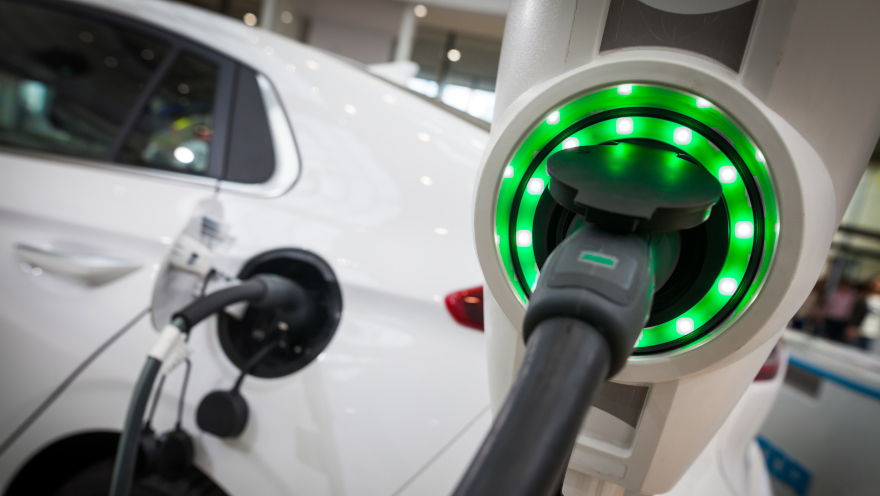EV ‘tipping point’: Studies find consumer interest rising faster than sales

By subscribing, you agree to receive communications from Auto Remarketing and our partners in accordance with our Privacy Policy. We may share your information with select partners and sponsors who may contact you about their products and services. You may unsubscribe at any time.
The latest surveys show American consumers are poised to buy electric vehicles in record numbers as manufacturers race to introduce new electric models into the market.
But that’s not the whole picture, according to research from Cox Automotive.
While Ernst & Young’s EY Mobility Consumer Index reported that almost half (48%) of U.S. potential car buyers intend to purchase an EV in the next 24 months, Cox’s 2023 Path to EV Adoption: Consumer and Dealer Perspectives report showed a gap between consumers’ stated enthusiasm for EVs and their actual purchasing decisions.
The Cox study also found American dealers are not yet ready to meet a potential high demand for EVs in both the sales and service departments.
EY Americas mobility sector leader Steve Patton said the data shows the U.S. is at a “tipping point” for EVs.
“On the heels of government legislation aimed at mitigating consumer concerns and driving increased collaboration between private and public sectors, this year’s data demonstrates that the U.S. is at a true precipice when it comes to mainstream EV adoption,” he said in the analysis. “We can expect to see more EVs, both commercial and consumer, on the road.”
Subscribe to Auto Remarketing to stay informed and stay ahead.
By subscribing, you agree to receive communications from Auto Remarketing and our partners in accordance with our Privacy Policy. We may share your information with select partners and sponsors who may contact you about their products and services. You may unsubscribe at any time.
EY’s global survey of more than 15,000 consumers from 20 countries showed U.S. interest in purchasing EVs — including fully electric vehicles, hybrids and plug-in hybrids — at an all-time high, up 19 percentage points from 2022. That’s the largest increase of any nation surveyed.
The Cox Automotive survey of 1,024 consumers and 152 dealers in the U.S. also showed high interest in EV, with 51% of consumers saying they are now considering a new or used EV, up from 38% in 2021. Cox is projecting 1 million new EVs will be sold in the U.S. in 2023, more than twice the number sold in 2021.
But it also pointed out that despite the widespread interest in EVs, those 1 million sales would account for less than 8% of total new vehicle sales in 2023. The EV share of the used-car market remains at approximately 1%.
In many parts of the country, the Cox Automotive study found, new EV products arrive more quickly than consumers are buying, leading to increasing inventory levels. In June, Cox said, EV days of supply was approaching 100 days, nearly twice the industry-wide average — evidence, it said, that EV consideration is well ahead of sales.
According to the Cox study, cost is the top obstacle to an EV purchase — 43% of intenders said they are too expensive, up slightly from the previous year. But just 32% cited a lack of charging stations as their top issue, down from 40 percent in 2021. On the other hand, EY said its study showed charging stations represent car shoppers’ No. 1 roadblock, citing the scarcity of charging stations and safety concerns about home chargers.
As for dealers, the study said, the gap shows up in their readiness to sell, service and embrace electric vehicles.
While 53% of consumers surveyed by Cox said EVs are the future and will largely replace gas engines over time, just 31% of dealers agreed, and 45% said EVs still need to prove themselves in the marketplace.
In addition, the study found more than half of new car dealerships say they are not prepared or “neutral” regarding EV sales and service capabilities, raising concerns about the overall customer experience and satisfaction. That situation could be helped by the fact that 82% of the dealers surveyed said they’re required by their OEM to make an EV investment.
The majority of dealers said they see electric vehicles as important to the growth of their dealerships, both in sales (55%) and service (57%), but they say they need more support and guidance from the factory in the form of comprehensive and up-to-date information — specifically in areas of charging infrastructure and battery technology. And while consumers overwhelmingly said they prefer to go to dealerships for EV servicing and maintenance, more than half of the dealerships surveyed are not fully prepared to handle EV-specific issues, with infrastructure for DC fast chargers and technicians dedicated to BEVs cited as the greatest needs.
The Cox study showed 55% of dealers who do not currently sell EVs expect to begin in the next year and 34% within the next six months. That coincides with manufacturers’ growing emphasis on EVs: 33 new models are being launched in 2023, according to estimates from Kelley Blue Book, and more than 50 additional new or updated EVs will be launched in 2024.


